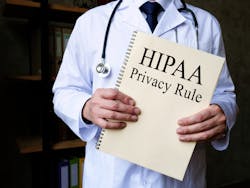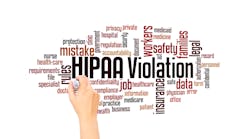The U.S. Department of Health and Human Services has proposed significant changes to the HIPAA Privacy Rule with the goal of reducing impediments to care coordination and case management communications among individuals and providers.
HHS is proposing a compliance date of 180 days after the effective date of a final rule, and the Office for Civil Rights would begin enforcement of the new and revised standards 240 days after publication of a final rule.
Several of the proposals modify provisions related to the individuals’ right of access to protected health information, including strengthening individuals’ rights to inspect their PHI in person, which includes allowing individuals to take notes or use other personal resources to view and capture images of their PHI. Another change shortens covered entities’ required response time to no later than 15 calendar days (from the current 30 days) with the opportunity for an extension of no more than 15 calendar days (from the current 30-day extension).
The proposed rule clarifies the form and format required for responding to individuals’ requests for their PHI. It requires covered entities to inform individuals that they retain their right to obtain or direct copies of PHI to a third party when a summary of PHI is offered in lieu of a copy.
It reduces the identity verification burden on individuals exercising their access rights. HHS claims this will create a pathway for individuals to direct the sharing of PHI in an EHR among providers and health plans, by requiring providers and health plans to submit an individual’s access request to another provider and to receive back the requested electronic copies of the individual’s PHI in an EHR.
The Notice of Proposed Rule Making (NPRM) also requires providers and health plans to respond to certain records requests received from other providers and health plans when directed by individuals pursuant to the right of access.
The NPRM specifies when electronic PHI (ePHI) must be provided to the individual at no charge and amends the permissible fee structure for responding to requests to direct records to a third party. It requires covered entities to post estimated fee schedules on their websites for access and for disclosures with an individual’s valid authorization and, upon request, provide individualized estimates of fees for an individual’s request for copies of PHI, and itemized bills for completed requests.
The rule would create an exception to the “minimum necessary” standard for individual-level care coordination and case management uses and disclosures. The minimum necessary standard generally requires covered entities to limit uses and disclosures of PHI to the minimum necessary needed to accomplish the purpose of each use or disclosure. This proposal would relieve covered entities of the minimum necessary requirement for uses by, disclosures to, or requests by, a health plan or covered health care provider for care coordination and case management activities with respect to an individual, regardless of whether such activities constitute treatment or health care operations.
As social determinant of health work becomes more central to population health, the rule also clarifies the scope of covered entities’ abilities to disclose PHI to social services agencies, community-based organizations, home and community-based service providers, and other similar third parties that provide health-related services, to facilitate coordination of care and case management for individuals.
It replaces the privacy standard that permits covered entities to make certain uses and disclosures of PHI based on their “professional judgment” with a standard permitting such uses or disclosures based on a covered entity’s good faith belief that the use or disclosure is in the best interests of the individual. The proposed standard is more permissive in that it would presume a covered entity’s good faith, but this presumption could be overcome with evidence of bad faith.
It expands the ability of covered entities to disclose PHI to avert a threat to health or safety when a harm is “serious and reasonably foreseeable,” instead of the current stricter standard which requires a “serious and imminent” threat to health or safety.
The rule eliminates the requirement to obtain an individual’s written acknowledgment of receipt of a direct treatment provider’s Notice of Privacy Practices (NPP) and modifies the content requirements of the NPP to clarify for individuals their rights with respect to their PHI and how to exercise those rights.


